modal verbs 1
modal verbs

3)表示“可以”或“被允许”。如: )表示“可以” 被允许” You can not leave your work undone. Can I use your bike? 表示建议或请求, 用could表示建议或请求,语气更委婉。主要用 表示建议或请求 语气更委婉。 于疑问句,一般不用于肯定句, can。 于疑问句,一般不用于肯定句,答语应用 can。 如:Could I come to see you tomorrow? Yes, you can.(No, I’m afraid not.) Might I sit here? Yes, you may.
ቤተ መጻሕፍቲ ባይዱ
2)表推测 用于肯定句) 表推测( 用于肯定句) 表推测 must +动词原形 动词原形 (对于现在情况的推测) 对于现在情况的推测) must+be +现在分词 现在分词 (表示“一定”正在做……) 表示“一定”正在做 ) must+ have +过去分词 过去分词 (表示对过去情况的推测。) 表示对过去情况的推测。)
be able to 可用于更多的时态,另外,can 和be 可用于更多的时态,另外, able to 不能连用。 不能连用。 5)表推测(用于疑问句和否定句) )表推测(用于疑问句和否定句) Can/ could(not) +动词原形 动词原形 (对于现在情况的推测) 对于现在情况的推测) Can/ could(not) +be +现在分词 现在分词 (表示“想必”、“可能”,“一定”正在 表示“想必” 可能” 一定” 做……) ) Can/ could(not)+ have +过去分词 过去分词 (表示对过去情况的推测。) 表示对过去情况的推测。)
modal verbs

张琬婧
Who can read it fastest and more clearly?
Tongue twister
(绕口令)
aux.能;可能 vt.将…装入罐中 保存 n.(食品)罐头
Can you can a can as a canner(罐头制造商)can can a can ?
May you have a nice day.
May you succeed. 祝你成功!
和外国人拼英语
一人在公交车上不小心踩了外国人的脚,心想 咱不能给中国人丢脸,于是卯足了劲说了句英文: “I’ m sorry” 外国人一想:在人家国土上咱不能不礼貌。于 是忙点头:“I’ m sorry too” 此人一听急了:Two?以为我不会数数?咬牙道: “I’ m sorry three” 外国人大惑不 解“What are you sorry for?” 此人心想好啊,连FOUR也出来了,我和你拼 了:“I’m sorry five!!!!”
你能够像罐头制造商一样装罐头吗?
Five Golden Rules
一般疑问句 (升调)语调)
Sense group (意群)
Liaison (连读)
辅音结尾,元音开头
Stress (重读) Pronunciatio n (发音)
介词、连词、冠词、 代词等虚词要弱读
Can _______ I help you?
can/could:
2.在疑问句中,用could可表示请求,语 气较委婉。
Could I speak to Mr. Smith, please?
Could — ____ I smoke here ? can — Yes, you _____. can’t / No, you _____.
modal verb(情态动词)
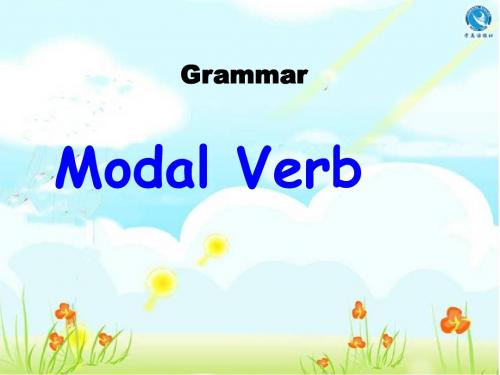
Modal Verb
什么是情态动词? (Modal Verbs) 情态动词表示说话人的某种 感情或语气,对某一动作 或状态的某种态度。 表示“需要、可以、 必须、应当”等。
情态动词的语法特征
1. 情态动词不能单独做谓语,除ought 和have外,后面只能接不带to的不定式。 2. 情态动词没有人称,数的变化,但有 些情态动词,如can, will也有一般式 和过去式的变化。
may 常用来表示: A. 表示请求、允许: B. 表示说话人的猜测: “也许” “可 能”: 通常只用于肯定句和否定句中。
C. 表示祝愿; 但语气较正式: might 的用法有: 多在间接引语中表示过去的可能和允 许。如: She said that he might take her bike. 她说他可以拿她的自行车去用。
表示现在的许可,语气比may 较委婉,
一般用于疑问句(包括间接疑问句),
不可用于肯定句或者否定句。
如: Might I have a word with you?
我可以和你说句话吗?
will和would
1. will是助动词还是情态动词?
will用于构成将来时是助动词。
用于表示“意志”“决心”“请求”是
2. 表示否定的情态动词的用法:
部分情态动词的否定式是情态动词中的 考点之一。 mustn’t 不准; 禁止 needn’t 没必要 ( = don’t have to ) can’t 不能; 不可能 may not 不可以; 可能不 shouldn’t 不应该 ( = ought not to )
表示主语的义务或责任: You should take care of your sister. 你应当去照顾你妹妹。 或指出一个正确、明智的动作: They shouldn't allow parking here; the street is too narrow. 这儿不该允许停车;马路太窄了。
Modal verbs
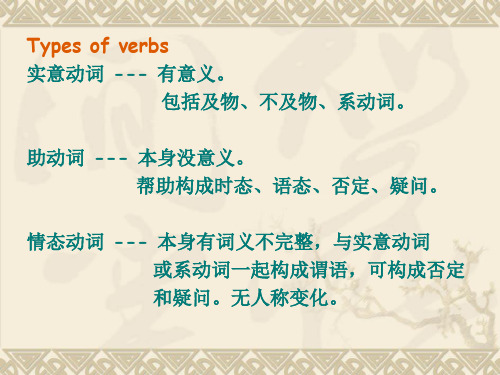
3) ought to / used to / have to (否定形式) oughtn’t to do… usedn’t (usen’t) to do… / didn’t use to do… don’t / didn’t / won’t have to do…
3. must 必须、必要 / have to 不得不 1)Must I finish the work today? --- Yes, you must. --- No, you needn’t. No, you don’t have to. 2) must do/ must have done 表肯定的猜测 3) You mustn’t talk loudly in the readingroom, must you?
c.f. didn’t need to do (没必要,也不一定做)
4. 表过去虚拟语气条件句中 If he had listened to you, he would / should / might / could have passed the test. 本来会/本应该/本可以/本能够
III. Special 1) may / might as well do … had better (not) do… c.f. It is better to do than (to) do … would rather (not) do … would rather do … than do … 2) can’t (help / choose) but do … c.f. can’t help doing … can’t help (to) do … can’t … too … You can’t be too careful.
modal verbs 情态动词
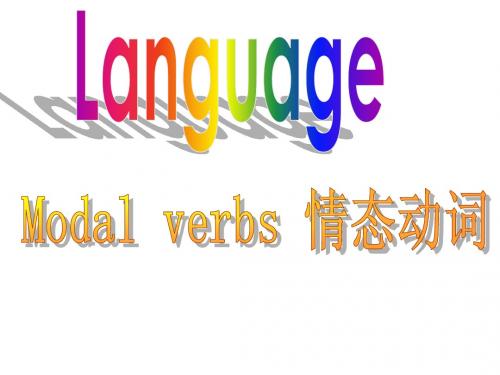
You must not cycle.
You must not enter.
You must be careful.
You must turn left.
You must pay ten yuan.
You must keep silent.
You must not smoke. You must not turn right.
★
情态动词
情态动词不能单独作谓语动词,后接其它 动词原形做谓语,没有人称和数的变化。
1. 表示能够或不能做某事用can 或 can’t;
A bird can fly . Fish can’t live without water.
2. 告诉人们必须或禁止做某事用must
或mustn’t;
You must hand in your homework at once. You mustn’t talk loudly in public.
肯定句 1. 现在时 2. 过去时 1. I can speak Chinese. 否定句 1. 现在时 2. 过去时 1. I can’t speak Chinese.
2. I could speak Chinese when I was a kid.
2. I couldn’t speak Chinese when I was a kid.
subtract ____ Can Kitty _________? Yes, she can. _____________
may (perhaps) 也许,可能
• “may” 常被用来表达可能性,也可以表示 请求。
表示请求: May I use your bathroom? 表示可能性 :I may go shopping in the afternoon. may的过去时 might He might be our new teacher. PS:might也可以表示推测,可能性比may小,语 气更婉转。
Modal Verbs1

Modal Verbs (情态动词)一、情态动词:can, could, may, might, mist, need, ought to, dare, 有时shall, should, will,would 在一定场合下也算作情态动词。
二、情态动词的用法:1.情态动词后接动词原形表示现在的情况e.g. We must work hard at our lessons.We ought to help each other in our study.2.情态动词后接动词的完成形式构成谓语表示过去的情况,意为:“应当已经…,“想必已经…等1). can / could /may / might /must + have done表示对过去事件的推论,意为;“可能”“也许”“一定”已经做了某事。
e.g. The ground is wet. It must have rainedlast night .2). should / ought to + have done 表示本应该做而没有做。
e.g. I should have bought that fashion shoesyesterday, but I didn’t .Your grandfather died. He ought to haveenjoyed his leisure time.3). should not / ought not to + have done 表示本不该做而做了。
e.g. The man is very clever. He ought not tohave done such a stupid thing.4). needn’ t + have done表示做了不必做的事,意为:“本不必”e.g. You needn’t have bought that coat, we canmake one for you.You needn’t have seen me, I will go backthis afternoon.Exercises (情态动词)1. You are late for work again. You ____have been here an hour earlier.A. shouldB. mayC. mustD. could2. That’ s all right. I can deal with it. You ____ with me.A. don’t need goB. need not go toC. need not goD. need go3. To travel from American to England you must have a passport, but to travel from England to Scotland you ____ .A. mustn’tB. can’tC. don’t haveD. needn’t have4. The house is dark. The Greens ____ to bed.A. must have goneB. should goC. should have goneD. must go5. His English composition is not too good, she ___ itherself.A. can’t have writtenB. won’t have writtenC. mustn’t have writtenD. should have written6. My purse was not found . I ____when I was in a train.A. must dropB. had droppedC. should have droppedD. must have dropped7. They didn’t seem surprised when I told them the news. They ___ about it.A. may have knownB. will have knownC. need have knownD. should have known8. The room is in a terrible mess, it ___ cleaned.A. can’t have beenB. shouldn’t have beenC. mustn’t have beenD. wouldn’t have been9. You ____ the job yesterday. We have a secretaryTo do that kind of thing.A. needn’t have doneB. mustn’t have doneC. should have doneD. can’t have done10. You ___her yesterday. She has been out for two days.A. needn’t have seenB. must have seenC. might have seenD. can’t have seen11. He thought it ___ last night.A. couldn’t rainB. couldn’t have rainedC. mustn’t have rainedD. needn’t have rained12. He ___ at the meeting, but I didn’t notice him there.A. must have beenB. would have beenC. may have beenD. must be13. He hasn’t come yet, he ___ an accident.A. must have beenB. would have beenC. may have beenD. must be14. He ___ be Canadian because he has got a Japanesepassport.A. can’tB. isn’t ableC. mustn’tD. doesn’t15. I was really anxious about you . You __ homewithout a word .A. mustn’t leaveB. shouldn’t have leftC. couldn’t have leftD. needn’t leave16. I am not feeling well in the stomach. I ___ so muchfried chicken just now.A. shouldn’t eatB. mustn’t have eatenC. shouldn’t have eatenD. mustn’t eat17. My English-Chinese dictionary has disappeared.Who ___ have taken it?A. shouldB. mustC. couldD. would18. Mr. White ___at 8:30 for the meeting, but he didn’tShow up.A. should have arrivedB. should arriveC. should have had arrivedD. should be arriving19. __ Tom graduated from college at a very young age.__Oh, he ___have been a very smart boy then.A. couldB. shouldC. mightD. must20. __I will tell Mary about her new job tomorrow.__ You ____her last week.A. ought to tellB. would have toldC. must tellD. should have told。
情态动词讲解课件

1.Can this be an excuse for not giving them help? 表示惊异、怀疑、不相信 2.This can’t be true. 等态度,主要用在否定句、 3.How can you be so crazy. 疑问句和感叹句中。
特别说明:
1.could用来表示请求时,语气委婉,主要用于疑问句,不能用于肯定句,答语应用can(即:could不能 用于现在时态的简略答语中)。如: ——Could I use your dictionary? ——Yes, you can.(否定回答可用:No, I’m afraid not.或者是you can’t)
1.May you succeed. 2.May you live happily! 3.May she rest in peace.愿她安息。
1.There is nothing to do, so I may as well go to bed. 2.You may as well tell us now, we’ll find out sooner or later. 3.I suppose we might as well go home.
在表示请求、允许时,might比may语气 更委婉些。用May I征询对方许可在文体 上比较正式,在日常用语中,用Can I征 询对方意见更为常见。
1.Might I borrow your pen 2.I wonder if I might speak to your son.
表示可能性的推测,通常用在肯定句和否 定句中,含有“或许”“大概”“可能” 之意;用might代替may时,则语气显得更 加不肯定。 may用于祈使句表示祝愿
1) 情态动词不能表示正在发生或已经发生的事情,只表示期待或估计某事的 发生。
modalverbs(1)
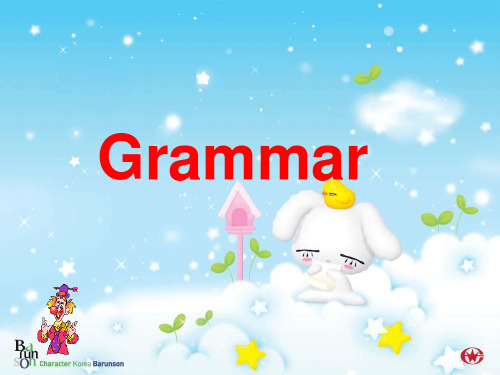
Modal Verbs
possibility: can / could, may / might certainty: must, will, should
ability: can / could, be able to
permission: can / could, may / might
只是可能性比may 小。
2) 成语:may/might as well,后面接不带 to 的不定式,意为"不妨"。 e.g. If that is the case, we may as well try.
3. have to和must 1) 两词都是“必须”的意思, have to 表示客观的需要, must 表示说话人 主观上的看法, 即主观上的必要。 e.g. My brother was very ill, so I had to call the doctor in the middle of the night. He said that they must work hard.
phone call?
---Well, I must have been sleeping, so I didn’t hear it. 5) 否定推测用can’t. e.g. If Tom didn’t leave here until five o’clock, he can’t be home yet.
1. 情态动词没有人称和数的变化,即情
态动词第三人称单数不加- s (have
to, have got to, be able to 除外)。 2. 情态动词不能表示正在发生或已经 发生的事情,只表示期待或估计某事 的发生。
3. 情态动词本身具有一定词义,但不
Modal Verbs

The negative is CAN’T (CANNOT)
E.g. I’m afraid I can’t come to your party on Friday.
CAN, COULD and BE ABLE TO
COULD: the past form of CAN; somebody had the general ability or permission to do something.
General ability present We prefer CAN
He can speak Spanish.
Specific achievement We prefer BE ABLE TO
He has now recovered from his injury and is able to drive again.
Modal Verbs
Eight Functions
Ability: can; could; be able to Permission: may; might; can; could Possibility: may; might; can; could Necessity: must; have to; need to Deduction: must; have to; can’t; couldn’t Obligation: should; ought to; had better; it’s time Prediction: will; would; shall Willingness, habits: will; would; shall
CAN, COULD and BE ABLE TO
BE ABLE TO: talk about an ability that someone has or had.
人教版高中英语必修三单元一Book3 Unit1 Modal Verbs情态动词

2. may 和 might
1) 表示许可或请求 permission/request may否定式可用may not,但表示“不可以”时 常用must not(mustn't) 代替may not. 用might提问,用may回答。might比may委婉。 - May/Might I go with my friends to the harvest festival? -Yes, you may. -No, you may not./ No, you mustn't./ No, you'd better not. 2)表示可能性possibility 语气强弱 may › might
人教版高中英语必修三单元一 Book3 Unit1 Modal Verbs情态动
词
定义: 情态动词表示说话人对某一动作或 状态的态度。
特点: 1. 情态动词不能单独作谓语, 必须和动词原形连用。 She can play basketball.
2. 情态动词没有人称和数的变化。
一些情态动词的过去式: can - could may - might shall - should will - would have to - had to
5. will 和 would
1)表示“意愿”,“允诺”,可用于所有人称。 I will tell you all about that. He won't go with us. 2)表示请求,用于第二人称。 用would提问,用will回答。would比will委婉。 Will you like a cup of tea? -Would you like a cup of tea? -Yes, I will./Yes, I'd love to. -No, thanks. 3)表示习惯动作或某种倾向,用于第三人称。 Fish will die out of water.
modal verbs

11. 表邀请: Will/ Would you (please) sing us a song?. 12. 表请求:Can/ Could you tell me how to get to the railway station? 13. 最好,表建议或劝告:had better 14. 过去常常: used to, would 15. 宁愿:: must, should, ought to 7. 表可能的推测: may/ might (might 表不肯定) can/ could 表肯定的推测: must 表肯定不可能: can't 表可能不: may not/ might not
询问可能性: can/ could(疑问句句中常用) 8. 征求对方意见: Shall I see you off at the station? 9. 提出建议: 10. 表意愿: Shall we go there by taxi? will/ would,shall(第一人称)
used to 和 would 1. used to 侧重于强调过去与现在的对照 . We used to have a cold bath in winter, but we don't now. 2. would 常含有表示过去的从句 . The old teacher would tell us fair tales when he had time. 3. 表示过去的状态和心理活动多与 表示过去的状态和心理活动多与used to 连用 . There use to be fish in the river. . People use to believe that the moon had its own light.
1. 表能力:
modal verbs讲解

情态动词modal verbs情态动词表示说话人的某种感情或语气,对某一动作或状态的某种态度,表示“需要”“可以”“应该”等意义。
情态动词有以下特征:1. 不能单独作谓语,除ought to 和used to 以外,后面只能接不带to 的不定式。
2. 没有人称和数的变化。
但有些情态动词,如can, will, dare有一般现在时和过去时的变化。
3. 情态动词的“时态”形式并不是区别时间的主要标志,很多情况下,情态动词的现在时形式和过去时形式都可用来表示现在时间、过去时间或将来时间。
PartⅠ1 . 表示“能力”与be able to 的区别:can 只有现在和过去时态,强调能力;be able to有各种时态,表示“一时”, “某一次具体”的能力,强调结果.was / were able to : “(过去)成功地做到…”Mary can play the piano .She has been able to play it since she was 5.Yesterday I was able to get home before the heavy rain.A big fire broke out in the hotel last night. Fortunately, all people were able to escape.相当于managed to do sth. /succeeded in doing sth.2.表示“许可”、“请求”(表示请求时,口语中常用could 代替can,使语气更加婉转,但回答要用can。
)--Could I use your bike? --Yes, you can.3.表示“理论上或一时的可能”(主要用于肯定的陈述句)Anybody can make mistakes. It can be dangerous to go traveling without a mate.Wuhan can be very hot in summer.I like kids, but they can be very naughty sometimes.4. 表示推测(主要用于否定句和疑问句) (此时,could表示可能性比can 低,不表示过去时)He can't be at home, for the lights are off. Can the news be true ?You couldn’t have seen me in the museum yesterday, because I was sleeping at home all day.在这种用法中,can / could也可以表示惊讶、怀疑、不相信的态度。
modal verbs

难点对比
have done 表示对已经发生事情的肯定猜 测.“必定已经” • can’t / couldn’t have done, 表示对已经发生 事情的否定猜测. • may / might have done, 表示对已经发生事情 的不确定的猜测 •should / ought to have done 表示”本来应该做 到,但实际未 做到”,常含有责备口气.(否定形式 表示”本不该做而做了”) • Can/could have done 表示有能力或有可能做 而实际没有做. • needn’t have done 本不必做的事却做了
Grammar
Modal verbs
情态动词
情态动词(Modal Verbs)
ability possibility 能力 可能性 建议
Can / could
advice
May / might
Will / would
agreement 赞同
guessing
necessity
猜测
必要性
Shall / should
2.may / might 1). 表示许可(疑问句)。 表示请求,允许时, might 比may 的语气委婉。否定回答时, 可用can't 或 mustn’t, 表示“不可以,禁止,阻止”之意。 --- May I take this book out?
--- No, you can’t (mustn’t).
(2007 江苏卷) A. should C. must B. could D. might
2. —Where is my dictionary? I remember I put it here yesterday. —You ______ it in the wrong place. (2007 江西卷) A. must put B. should have put C. might put D. might have put
10modal verb1
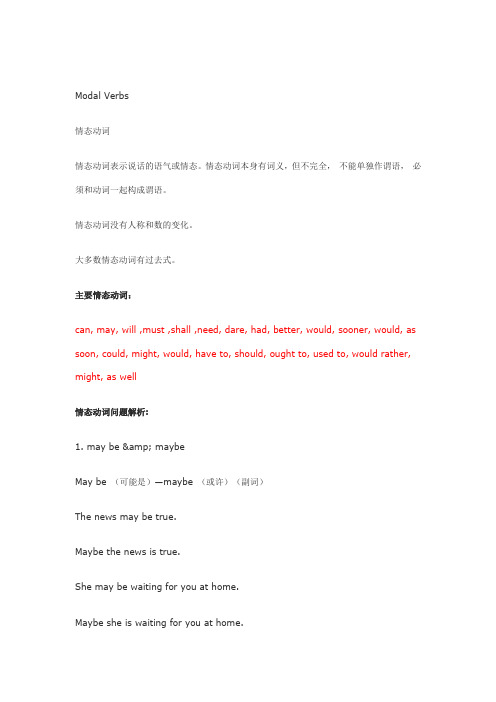
Modal Verbs情态动词情态动词表示说话的语气或情态。
情态动词本身有词义,但不完全,不能单独作谓语,必须和动词一起构成谓语。
情态动词没有人称和数的变化。
大多数情态动词有过去式。
主要情态动词:can, may, will ,must ,shall ,need, dare, had, better, would, sooner, would, as soon, could, might, would, have to, should, ought to, used to, would rather, might, as well情态动词问题解析:1. may be & maybeMay be (可能是)—maybe (或许)(副词)The news may be true.Maybe the news is true.She may be waiting for you at home.Maybe she is waiting for you at home.2. May not & can notmay not 译为“可能不”、“也许不会”而非“不可以”。
“不可以”为must not或can't(不许,不可以)。
---May I smoke here?---No, you mustn't. /you can't /you can not.The news may not be true.You mustn't move any of the papers on the desk.3. Can & be able toBe able to 可以表示更多的时态。
We will be able to finish the work tomorrow.He was not able to realize his greatest ambition.Are you able to design a new computer program?She has not been able to work out the complex problem.4. ought to的否定式ought to的否定式是ought not to,疑问句只把ought提前。
grammar-(modal-verbs)

Peter has a good car and a big house with a garden.
must have lots of money. He ______ must be popular with people. He ______ can’ t be lacking in money. He ______
二、情态动词的语法功能
1.We use modal verbs to talk about: (1) Ability (能力) (2) Obligation (义务) (3) Certainty (可能性) (4) Permission (允许)
2.We also use modal verbs to:
Grabs)
本身没有一定的词义,表示语气的单词。但是不能独立 作谓语,只能和动词原形一起构成谓语。情态动词用在行为 动词前,表示说话人对这一动作或状态的看法或主观设想。 情态动词虽然数量不多,但用途广泛。
What can it be?
a white vase It may be ___________. two faces It might also be _________.
can 和 be able to 的区别
1)时态:can 只有现在时和过去式(could),be able to 可用于多种时态。(在将来时,完成时和非谓语 动词中应该用be able to)
e.g. So far, doctors have been able to do very little to treat(治疗) this kind of disease.
He is only four, but he can read. I can climb this mountain.
ModaL verb1

C. 表示说话者对某事难以置信,感到惊讶, 表示说话者对某事难以置信,感到惊讶, 可译作" 竟然" 多用于从句中. 可译作"竟,竟然",多用于从句中. We are sorry you should feel uncomfortable.
must和can't: 5. must和can't:
must 用来表示"命令","推测"等含义. 用来表示"命令" 推测"等含义. 1)表示规定,指令 )表示规定, 表示规定, 指令时主要指客观上的法律, 表示规定 , 指令时主要指客观上的法律 , 条文规 定,常常翻译为"应该,必须"之类意思. mustn't表示禁止 表示禁止 You must have a passport if you want to go abroad.
2) 表示请求(request)或(permission).意为 表示请求( ).意为 ) ).
更有礼貌, "可否","可以". could 比can 更有礼貌, 可否" 可以" 在此不是can的过去式. 在此不是 的过去式. 的过去式 Can you wait a moment, please? I wonder if you could help me. ---- Could I use your phone? ----Yes, of course. You can. (request) Do you think I could borrow your bike? (permission)
shall和should: 4. shall和should:
1)shall 的用法 ) a. shall 用于第一人称,表示将来的动作. 用于第一人称,表示将来的动作. The harvest festival begins on Satuiday. We shall be there with our friends. b. shall 在疑问句中用于第一,第三人称,表示征 在疑问句中用于第一,第三人称, 求对方的意见. 求对方的意见. Shall we put off the sports meeting until next month? Shall Tom go there with me tomorrow?
modal verbs

Modal verbs 情态动词一.表示能力can/couldbe able to(除最基本用法外,还有表示成功做某事的用法)二.表示猜测1.可能can/couldmay/might(may/might well do 表示极有可能)must2.不可能can’t/could n’t3.表示猜测的情态动词+have done(对过去已经完成动作的猜测)三.表示请求can/couldmay/might表示允许can/couldmay/might四.表示建议shouldought to do(应该)had better do(最好)may/might as well do(不妨)五.表示必须have to(客观)must(主观)六.can’t/c ouldn’t和比较级连用表示“再…也不过”,表示肯定I can’t agree more.That couldn’t be better.It couldn’t be worse.1.—I’ve taken someone else’s green sweater by mistake.—It _________ Harry’s. He always wears green.A. h as to beB. will beC. mustn’t beD. could be2.—Do you know where David is? I couldn’t find him anywhere.—Well. He _________have gone far—his coat’s still here.A. shouldn’tB. mustn’tC. can’tD. wouldn’t3.—Lucy doesn’t mind lending you her dictionary.—She _________. I’ve already borrowed one.A. can’tB. mustn’tC. needn’tD. shouldn’t4.—Catherine, I have cleaned the room for you.—Thanks. You _________it. I could manage it myself.A. need n’t doB. needn’t have doneC. mustn’t doD. shouldn’t have done5. The fire spread through the hotel very quickly but everyone __get out.A.had to B.would C.could D.was able to6. —The woman biologist stayed in Africa studying wild animals for 13 years beforeshe returned.— Oh, dear! She _________ a lot of difficulties!A. may go throughB. might go throughC. ought to have gone throughD. must have gone through7.Peter______be really difficult at times even though he’s a nice person in general.A.shallB.shouldC.canD.must8.The World Wide Web is sometimes jokingly called the World Wide Wait because it _________be very slow.A. shouldB. mustC. willD. can9. —It’s the office! So you______know eating is not allowed here.— Oh, sorry.A. mustB. willC. mayD. need10.What do you mean, there are only ten tickets? There _____be twelve.A. shouldB. wouldC. willD. shall11.Liza______well not want to go on the trip—she hates traveling.A.willB.canC.mustD.may12.She_______have left school, for her bike is still here.A.can’tB.wouldn’tC.shouldn’tD.needn’t13.You don't have to know the name of the author to find a book.You______find the book by the title.A.mustB.needC.canD.would14.Although this_______sound like a simple task,great care is needed.A.mustB.mayC.shallD.should15.It is usually warm in my hometown in March,but it_______be rather coldsometimes.A.mustB.canC.shouldD.would16.—I’m sorry.I_____at you the other day.—Forget it.I was a bit out of control myself.A.shouldn’t shoutB.shouldn’t have shoutedC.mustn’t shoutD.mustn’t have shouted17.You_____buy a gift, but you can if you want to.A. mustB. mustn'tC. have toD. don't have to18.I have told you the truth. ______ I keep repeating it?A MustB CanC MayD Will19.Just be patient .You ______ expect the world to change so soon .A. can’tB. needn’tC. may not D wil l not20. As you worked late yesterday, you___have come this morning.A. mayn’tB. can’tC. mustn’tD. needn’t21. --- Could I have a word with you, mum?--- Oh dear, if you ________.A.canB. mustC. mayD. should22.---How’s your tour around the North Lake? Is it beautiful?---It ________ be, but it is now heavily polluted.A.willB. wouldC. shouldD. must23. You can’t imagine that a well—behaved gentlemen ____be so rude to a lady.A.might B.need C.should D.would24. Johnny,you___play with the knife,you __hurt yourself.A.won’t;can’t B.mus tn’t:mayC.shouldn't;must D.can’t:shouldn’t。
Model Verb
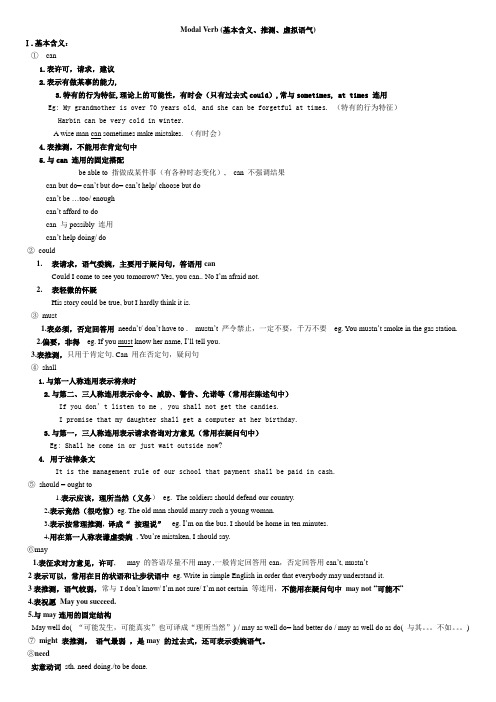
Modal Verb (基本含义、推测、虚拟语气)Ⅰ.基本含义:①can1.表许可,请求,建议2.表示有做某事的能力,3.特有的行为特征,理论上的可能性,有时会(只有过去式could),常与sometimes, at times 连用Eg: My grandmother is over 70 years old, and she can be forgetful at times.(特有的行为特征) Harbin can be very cold in winter.A wise man can sometimes make mistakes. (有时会)4.表推测,不能用在肯定句中5.与can 连用的固定搭配be able to 指做成某件事(有各种时态变化), can 不强调结果can but do= can’t but do= can’t help/ choose but docan’t be …too/ enoughcan’t afford to docan 与possibly 连用can’t help doing/ do②could1.表请求,语气委婉,主要用于疑问句,答语用canCould I come to see you tomorrow? Yes, you can.. No I’m afraid not.2.表轻微的怀疑His story could be true, but I hardly think it is.③must1.表必须,否定回答用needn’t/ don’t have to . mustn’t 严令禁止,一定不要,千万不要eg. You mustn’t smoke in the gas station.2.偏要,非得eg. If you must know her name, I’ll tell you.3.表推测,只用于肯定句. Can 用在否定句,疑问句④shall1.与第一人称连用表示将来时2.与第二、三人称连用表示命令、威胁、警告、允诺等(常用在陈述句中)If you don’t listen to me , you shall not get the candies.I promise that my daughter shall get a computer at her birthday.3.与第一,三人称连用表示请求咨询对方意见(常用在疑问句中)Eg: Shall he come in or just wait outside now?4. 用于法律条文It is the management rule of our school that payment shall be paid in cash.⑤should = ought to1.表示应该,理所当然(义务) eg. The soldiers should defend our country.2.表示竟然(很吃惊)eg. The old man should marry such a young woman.3.表示按常理推测, 译成“按理说”eg. I’m on the bus. I should be home in ten minutes.4.用在第一人称表谦虚委婉, You’re mistaken, I should say.⑥may1.表征求对方意见,许可, may 的答语尽量不用may ,一般肯定回答用can,否定回答用can’t, mustn’t2表示可以,常用在目的状语和让步状语中eg. Write in simple English in order that everybody may understand it.3表推测,语气较弱,常与I don’t know/ I’m not sure/ I’m not certain 等连用,不能用在疑问句中may not “可能不”4.表祝愿May you succeed.5.与may连用的固定结构May well do( “可能发生,可能真实”也可译成“理所当然”) / may as well do= had better do / may as well do as do( 与其。
情态动词
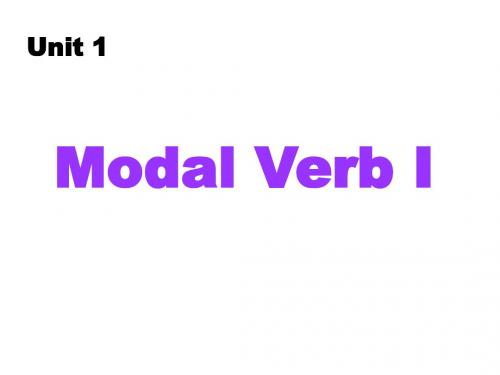
用May I...?征徇对方许可时比较正式和 客气,而用Can I...?在口语中更常见。 2)用于祈使句,表示祝愿。 May you succeed!
Can may must表示推测 can表示推测(惊讶、怀疑、不相信的态度) ,用于疑问句、否定句和感叹句中。 Can this be true? This can’t be done by him. How can this be true?
3) dare和 need作实义动词用时, 有人称、 时态和数的变化。在肯定句中, dare后面常接带to的不定式。 在疑问句和否定句中,dare后面可接带 to或不带to的不定式。而need后面只能 接带to的不定式。 1. I dare to swim across this river. 2. He doesn’t dare (to) answer. 3. He needs to finish his homework today.
1. Shall shall用于构成将来时是助动词,shall用于征求对方的意 见,表示“决心”是情态动词。 Perhaps I shall pay a visit to England this winter. I shall be there. (1)用于一﹑三人称,征求意见或提议。 Shall we go out for lunch? (2)用于第二、三人称,表一种强烈的感情,如“命令, 禁止,威胁,允诺”等. If you dare do that, you shall be punished. (3)在条约、规章、法令等文件中表义务或规定,一般用 于第三人称。‘应,必须’ 指示,预言等。 The new regulation shall take effect on June 1st
- 1、下载文档前请自行甄别文档内容的完整性,平台不提供额外的编辑、内容补充、找答案等附加服务。
- 2、"仅部分预览"的文档,不可在线预览部分如存在完整性等问题,可反馈申请退款(可完整预览的文档不适用该条件!)。
- 3、如文档侵犯您的权益,请联系客服反馈,我们会尽快为您处理(人工客服工作时间:9:00-18:30)。
SHOULDN´T HAVE
It´s used to express or show regret or express some criticism
I shouldn´t have drunk that much
HAD BETTER
FORM HAD BETTER+ BARE INFINITIVE HAD BETTER NOT+BARE INFINITIVE
MODALS OF POSSIBILITY AND CERTAINTY
100% SURE. must
50% POSSIBLE may/might
0% SURE / IMPOSSIBLE can´t
MODALS OF POSSIBILITY AND CERTAINTY
MUST
EX: lucy must be at home. The lights are on
SEMI-MODAL VERBS
BE ABLE TO: Suppletive form To express ability in all those tenses can, could can´t express
Ex: she hasn´t been able to find a job yet
Ex: She can´t have understood the question
SHOULD HAVE+ PAST PARTICIPLE
To express your opinions about something in the past. Now it´s too late
Ex: He should have agreed to come to the party. It was real fun
She had to get up early last Saturday since she had to attend a very important lecture
PROHIBITION AND NECESSITY
MUSTN´T
Ex: You mustn´t lie on your CV
MODALS + PERFECT INFINITIVES
Must have…. Logical inference about the past
Ex: you must have seen John at the party
MODALS + PERFECT INFINITIVES
Can´t ..
CHAPTER 3
Modal Verbs
Advance English Grammar
Hector Martinez Garcia
CHAPTER 3
Modal Verbs Practice Link
The followig web site is excellent to practice and revise modal verbs
OUTLINE
GENERAL FEATURES MODAL VERBS
Classified according to the meaning they express We will include semi-modals or suppletive forms A modal verb can appear in more than one meaning
MIGHT/MAY/COULD HAVE +PAST PARTICIPLE Something which was possible in the past but it didn´t finally happen
EX: She could have taken the job but she didn´t
May/might/could
EX: Peter has come to class today. He might be ill
Can´t
EX: Lucy can´t be at home. The lights are off
MODALS OF OBLIGATION
MUST ( Inner obligation)
(NOT HAVE TO)Remember to use auxiliary verbs
Ex: you don´t have to pick me up if
you don´t want to (it´s not compulsory) NEED
You need to take some time off
GENERAL FEATURES
MOST OF THEM ARE FOLLOWED BY BARE INFINITIVE Ex: She should be here by five o´clock They do not have inflections (-ed, -ing, 3rd person singular –s) Ex: He can speak five different languages They are negated by adding not Ex: She might not come since she is very angry with me We do not find those features in Be able to Have to Be allowed to
can
might
would must
will ought should to
Modals are different from normal verbs:
1: They don't use an 's' for the third person singular. 2: They make questions by inversion ('she can go' becomes 'can she go?'). 3: They are followed directly by the infinitive of another verb (without 'to').
I´d rather cook the dinner now. I´m in a hurry
I´d rather you didn´t cook. You are a terrible chef
RATHER
Used together with prefer
I prefer coke to water I prefer drinking coke to drinking water I prefer to drink coke rather than drink water I´d prefer to drink a coke rather than drink water
Was/were able(managed just once) to vs could (general ability in the past)
Ex: At the age of six, I could play the piano Ex: At the age of six, I couldn´t play the piano. But once, I was able to play the happy birthday song once.
could abuse you without any reason at all
a gerund, to-infinitive, a perfect tense
Be able to:
More formal. In the past to be allowed to , to be
NEEDN´T isn´t followed by to
Ex: you needn´t study for this exam
Advice
SHOULD/OUGHT TO They are used to express advice
Ex: You ought not to apply for that job
/modals/modalintro.html
Hector Martinez Garcia
Here's a list of the modal verbs in English:
CHAPTER 3
could may
shall
Here is a list of the modal verbs in English
Permission
CAN/MAY/COULD It depends on the degree of politeness
Can / May I come in? Could I come in Mr Robinson?
MODALS + PERFECT INFINITIVES (to have / ppart)
Ex: I´d rather not go out this evening if you don´t mind Ex: I´d rather stay at home than go out
WOULD RATHER
I´d rather you did something Notice the difference:
SUMMARISING (part 2)
CAN / COULD / MAY
Physical ability: I can speak English Senses: I can’t think of a solution Permission: May I go to the toilet? Asking: Could you give me...? Negative deduction: He can’t be there Probability: She could be here in a minute. Possibility: This new model can be red or white Conditional: He could go tomorrow Habitual Past: At that time he was very nervous; he
